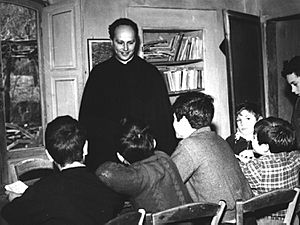Lorenzo Milani facts for kids
Lorenzo Carlo Domenico Milani Comparetti (born May 27, 1923 – died June 26, 1967) was an Italian Catholic priest. He is remembered as a special teacher for poor children. He also strongly believed that people should have the right to say "no" to fighting in wars if it goes against their beliefs, which is called conscientious objection.
About Lorenzo Milani
Lorenzo Milani was born in Florence, Italy, in 1923. His family was wealthy. His father, Albano Milani, and his mother, Alice Weiss, did not follow any religion strictly. Alice Weiss was Jewish and related to Edoardo Weiss, who was an early student of Sigmund Freud, a famous thinker about the mind. Lorenzo Milani's great-grandfather was Domenico Comparetti, a well-known expert in languages from the 1800s. Lorenzo Milani himself later focused on teaching people how to use words well.
In June 1943, after studying art at the Brera Academy, Lorenzo Milani changed his beliefs. He went from not being sure about religion to becoming a Catholic. This might have happened after a talk with Don Raffaele Bensi, who later became his spiritual guide. He also started caring more about poor people and those who were looked down upon, instead of just enjoying his family's wealth.
He became a priest in 1947. He was sent to help an older priest, Don Daniele Pugi, in a village called San Donato in Calenzano. There, he started his first "school of the people" (scuola popolare). This school was open to all children, whether their families were religious or not. This idea surprised some traditional Catholic groups. After Don Pugi passed away in 1954, Milani was sent to Barbiana. This was a small, quiet village in the Mugello region.
In Barbiana, Lorenzo Milani kept working on his new ways of teaching. He did this even though some church leaders and other people did not agree with him.
Lorenzo Milani's Writings
In 1958, he published his first book, Pastoral Experiences (Esperienze pastorali). A few months later, the Holy Office (a part of the Catholic Church) told him to stop selling the book. They said it was "inopportune," even though they couldn't find any mistakes in its teachings. Milani did not argue about this publicly.
He wrote a "Letter to Military Chaplains" ("Lettera ai cappellani militari"). In this letter, and another one he wrote to judges, he spoke up for conscientious objection. This means having the right to refuse to fight in a war if you believe it is wrong. His writings on this topic are seen as very important for teaching people about peace. In 1965, Milani was put on trial because of these writings.
For a year, Milani worked with his students to create another important book. It was called Letter to a Teacher (Lettera a una professoressa). This book criticized the unfairness of the school system. It showed how the system helped rich children more than poor children. Eight boys from the Barbiana school wrote the book together. They used a "group writing" method, where everyone worked as a team. This method was inspired by other teachers like Mario Lodi. The book has been translated into about 40 languages. It brought up many ideas that later became important in how we study education and society. The book became a powerful message for change in Italy.
His Impact and Passing
In 1967, soon after Letter to a Teacher was published, Lorenzo Milani passed away. He died from leukemia at his mother's home in Florence.
In 2008, Helena Dalli, a politician from Malta, described Milani's life and work. She said that Milani's ideas were seen as very new and even dangerous. Because of this, his bishop sent him to Barbiana, a small mountain village. They thought it was too far away for him to cause trouble. But in Barbiana, he started a full-time school for children who had struggled in regular schools. Many students of all ages came to learn from his teaching methods.
He invited artists, farmers, scientists, and other professionals to the school. They would give hands-on lessons about what they did. Students also read and discussed news from around the world. The goal was to teach them to think critically about events. This way, they could face life without fear and solve problems with confidence.
A documentary film from RAI (an Italian TV company) shows Lorenzo Milani's teaching project. It also shows how it affected Italian society. The film includes talks with former students from the Barbiana school.
Pope Francis visited Barbiana on June 20, 2017. He went to pray at Milani's tomb.
See also
 In Spanish: Lorenzo Milani para niños
In Spanish: Lorenzo Milani para niños
- Streetwise priest
 | Selma Burke |
 | Pauline Powell Burns |
 | Frederick J. Brown |
 | Robert Blackburn |


